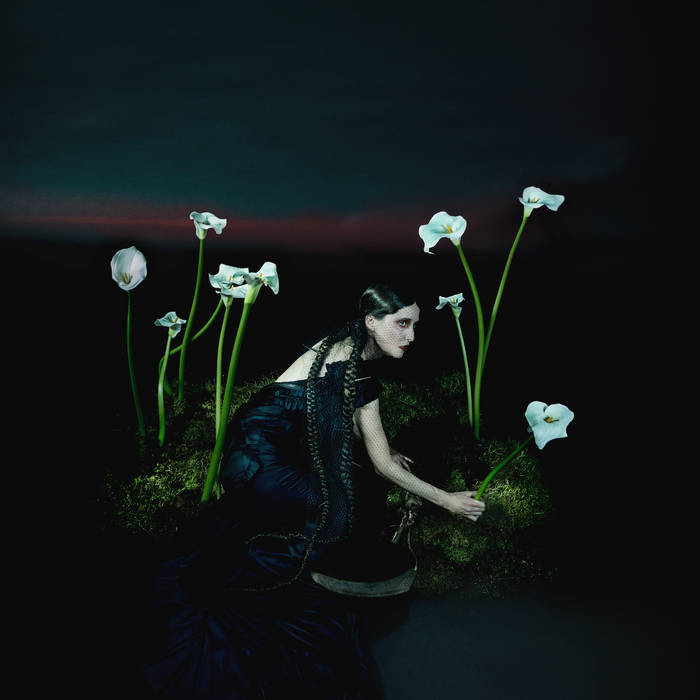The Breakdown
Penelope Trappes recognises she makes music goes deep and once described her approach as “digging up the underworld with visual motifs, and a mystical, gothic darkness that symbolises my struggles”. Now after over a decade of excavation, through four albums and inspired side projects, the Australian, now Brighton- based, experimental musician reveals that there is still more to be unearthed with her latest recording ‘A Requiem’ (out via One Little Independent). Introspective and authentic, the doom-laden shadows Trappes works within are not a façade. She is an artist who probes relentlessly into these spaces in order to draw out new meanings. So yes, ‘A Requiem’ has serious intentions but with cathartic possibilities.
The evocative opener Bandorai sets the reverential tone, a pagan canticle which hovers in a reverberating mix. It’s built around the yearning moan of long cello notes, an instrument which Trappes came to for this recording, its “nerve like strings” intuitively accompanying her vocals. “Shamanistic Mother” her multi-tracked voice pronounces, part operatic but not over dramatized and rich in an expressive sorrow.
As with all of Penelope Trappes albums, it’s that voice which is at the epi-centre, rooted in the poise and power of Diamanda Galas and woven with Gazelle Twin tense spookiness. On Platinum the vocal arcs naturally through waves of sorrow, as the tolling darkwave spell unfolds. Trappes keeps the imagery detailed but not too weighty, phrases short, sharp and memorable. “Double Scale. Double shift. Bluest Blue, Mother’s Gift” she sings softly, using rhyme and song structure to lure you in. This gift to conjure up music which is immediate and relatable rather than wilfully obscure and impenetrable underpins the strength of ‘A Requiem’. Take the rippling Red Dove which reflects on childlike innocence in a hostile world, while synth loops burble then suddenly stop. Somehow such mid-tune pauses never feel like an interruption which break the momentum. That’s because Trappes creates them with purpose as in this song, where she fills the silence with a hushed, heart-melting dedication to “the boy with a red dove”.
The narrative flow which Trappes weaves through each track also threads through the whole album. Atmospheric instrumentals bridge the song cycle but stand as brief statements in their own right rather than momentary interludes. The ominous Second Spring groans and squeals dramatically with cello distortion, Caro coos like a lost spirit and Torc swells symphonically. Perhaps Anchor Us To The Seabed Floor is the most stunning of these miniatures, as it soundtracks a descent through the fathoms to shimmering choral voices and unhinging electronic interference.
Trappes conceived ‘A Requiem’ as “a ceremonial collection of music” and there is a reverence and awe surrounding the music’s passageway. But this is no staged procession or expression of superficial grandeur. What makes these songs so engaging is that they are deeply personal and lived in. Trappes may be focusing on the big themes, life’s edging towards death and beyond, but she is doing so from her own experience of family, loss and memories. She’s certainly a composer who never shirks such intense personalisation. Her ambitious opening trilogy of albums, ‘Penelope One’, ‘Two’ and ‘Three’ drew from her new parenthood to explore love, grief, desperation and revival. So she may work within the experimental/electronic demographic but rather than shaping her music through her emotions she confronts such themes out in the open. This gives her songs their distinct impact and undeniable power.
The visceral A Sleep strains with the thoughts of what she describes as “longing for your parents’ life to come to a close, for them to peacefully escape their pain and be released” and not wanting loved-ones to be gone forever. It’s a piece that quivers tensely between scratchy reflections and pounding doom-metal accented realisation. Symphonic in scale, stripped of theatrics, it parallels Daniel Blumberg’s songs for stark honesty.
Later in the album Trappes shares more hope as the title track finds, if not comfort, some resolution. The song has a slowly evolving beauty. Here the cello’s deep droning breathes gradually ease into a surging melodic motif where Trappes recognises an ending which simply “Calls you home”. Such peacefulness extends to ‘A Requiem’s closing track, the gorgeous, elevating Thou Art Mortal which swoops like a traditional Gaelic air and trembles with Sigur Ros sensitivity. Resonant, deeply fulfilling, gently hopeful it’s the perfect conclusion to an album which speaks for itself but which, through its truthfulness, will also speak for many others.
Get your copy of ‘A Requiem‘ by Penelope Trappes from your local record store or direct from One Little Independent Records HERE














No Comment